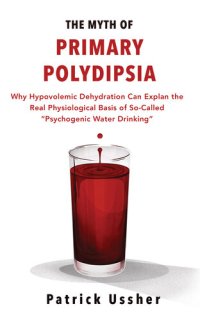
Ebook: The Myth of Primary Polydipsia: Why Hypovolemic Dehydration Can Explain the Real Physiological Basis of So-Called 'Psychogenic Water Drinking'
Author: Patrick Ussher
- Genre: Medicine // Endocrinology
- Year: 2023
- Language: English
- epub
‘The diagnosis of compulsive water drinking must be made with care and may represent our ignorance of yet undescribed pathophysiological mechanisms.’ - Prof. Daniel Bichet, University of Montreal, 2017.
Primary Polydipsia is currently considered to involve the over-drinking of fluids in the absence of any physiological need and usually, therefore, as a result of mental illness. This book argues that this current conception is the product of a catastrophic Freudian error. Indeed, the idea of “psychogenic water drinking" was first formulated by psychiatrists who attributed the condition variously to conversion disorders, delusional hypochondriasis, female hysteria, not having enough sex, troubled childhoods and other similar ideas of a Freudian nature. Worse is that this early psychological bias also informed the central physiological assumptions and diagnostic procedures regarding the condition, both of which have remained unchallenged to this day.
In this book, Patrick Ussher exposes the Freudian origins of Primary Polydipsia but also proposes a new, and very real, kind of polydipsia which can replace so-called “psychogenic water drinking” and explain its typical clinical presentation in physiological terms. Termed ‘Hypovolemic Dehydration’, this polydipsia is driven by an endogenously created and maintained state of low blood volume. Indeed, there exists a range of hypovolemic illnesses, in particular Myalgic Encephalomyelitis, Postural Orthostatic Tachycardia Syndrome and Long Covid, in which patients routinely suffer from excessive thirst. In all of these illnesses, a downregulation of blood-retention hormones can lead to an ongoing state of low blood volume, often involving a shortfall of around one litre of blood. As a result, the hypovolemic thirst centre activates but, unlike the osmotic thirst centre, this requires appropriately concentrated fluids in order to be quenched. The patient, unaware of the real reason for their thirst, understandably just drinks pure water and thereby enters a vicious cycle of never-ending thirst and urination. Is it patients with hypovolemic illnesses who have always been historically misdiagnosed as “psychogenic water drinkers”?
The tendency of medicine to suggest that symptoms it does not yet understand are psychosomatic has a long history and one that rarely ages well: Parkinson’s, MS and ME patients, among others, have all had to face this kind of stigma. This book argues that patients with so-called “Primary Polydipsia” fall into the same category. These patients are not mentally ill. Rather, their bodies scream with a thirst that is very real and which carries a serious risk of neurological injury and fatality. This book is therefore a clarion call for doctors and medical researchers to return to the drawing board and to reconsider Primary Polydipsia with fresh eyes so that the very sick can, at last, be treated effectively and compassionately by the doctors to whom they turn for help.